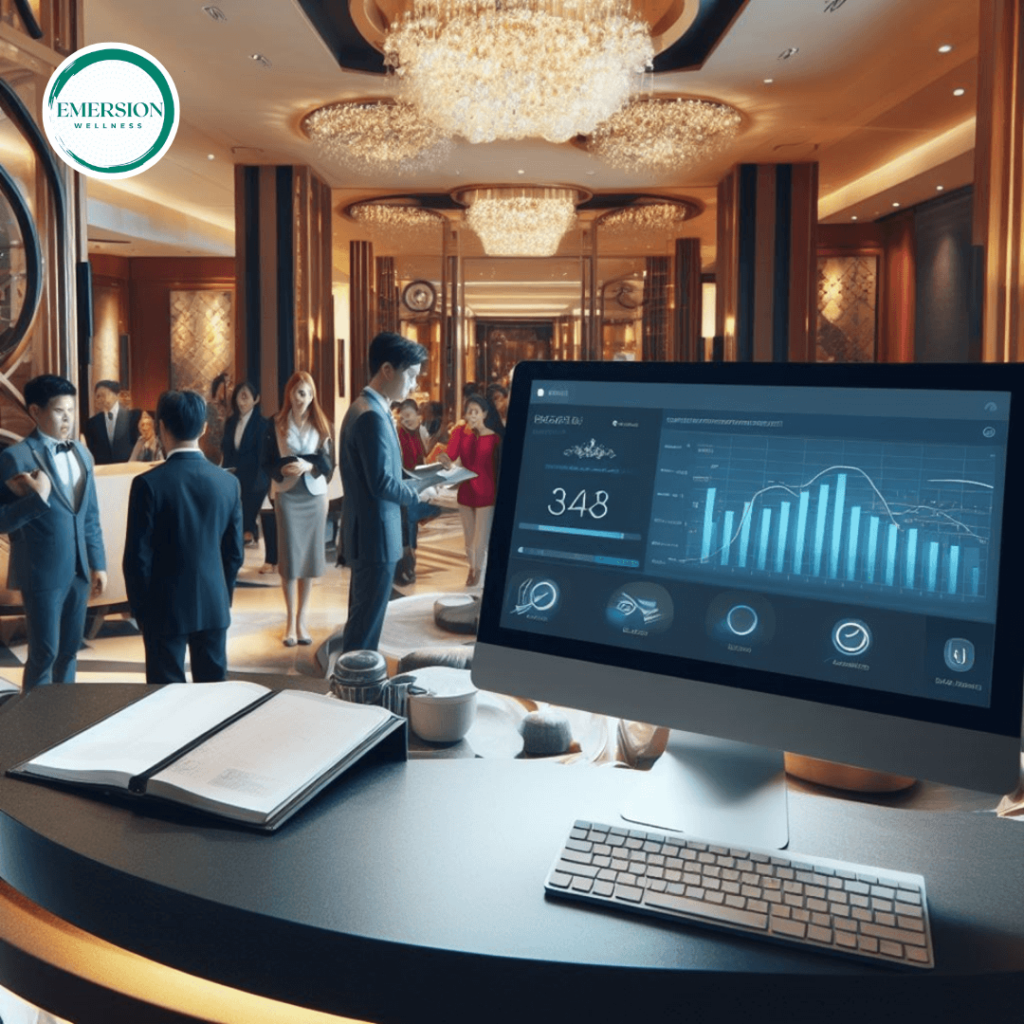Bali's tropical paradise is one of Indonesia's most popular tourist destinations. With pristine beaches, rich culture, and incredible scenery, it’s no wonder that visitor numbers continue to rise annually. However, this influx of tourists also brings fierce competition between hotels looking to capitalize on this high demand. Innovative revenue management strategies are essential for success in Bali’s crowded hospitality market.
This article will explore proven tactics and technologies hotels can leverage to boost top-line revenues, even during competitive low seasons. Actionable tips will cover pricing, distribution, segmentation, operational efficiency, and customer experience optimization. Read on for insights to help your Bali hotel capture higher-rated bookings and maximize revenues all year round.
Key Takeaways:
- Bali's hotel competition is fierce, requiring creative revenue tactics.
- Smart segmentation, pricing, channel mix, and efficiency maximize revenues.
- Focusing on customer experience builds loyalty and repeat stays.
- Automated revenue technology allows quick adaptation to market shifts.
- Partners like Emersion Wellness provide revenue strategy expertise.
Table of Contents
Understanding Dynamics in the Hotel Market of Bali.
To succeed amid fierce competition, Bali hoteliers must intimately understand local market forces, customer behaviors, and the external factors that impact revenues. Key dynamics include:
Extreme Seasonality
Bali’s hotel occupancy fluctuates severely between high and low seasons. Average occupancy exceeds 90% in July/August peak, dropping to 60% in September and even lower from November to March. European holidays drive seasonal peaks in the Hotel Market of Bali.
Increasing Supply
Mass tourism growth has spurred a rapid increase in hotel room supply, particularly 3-star and budget properties. Luxury 5-star supply is also growing. This dilutes demand and makes pricing power harder to sustain.
Internet Reliance
Online and mobile channels account for over 80% of hotel bookings in Indonesia. This makes digital marketing and e-commerce optimization critical for reaching and converting target audiences in the Hotel Market of Bali.
OTA Dominance
Almost 70% of Indonesian online bookings go through OTAs like Agoda, Booking.com, and Traveloka. This high OTA reliance pressures room rates and hotel profit margins.
Short Booking Windows
Over 60% of Bali hotel bookings are made 0-7 days before arrival. Last-minute bookings make demand forecasting and revenue management harder.
Value-Sensitivity
Bali attracts a high mix of budget travelers focused on price over amenities. Luxury seekers also demand exclusive experiences and personalized service to justify premium rates.
Each hotel must build revenue strategies tailored to these unique market conditions and customer behaviors. Tactics that work during low season may require adjustments to maximize high season potential.
Advanced Pricing and Segmentation Strategies
Smart pricing and segmentation enable Bali hotels to match room rates accurately to demand. By optimizing revenue from each customer group, hotels maximize income while maintaining occupancy.
Dynamic Pricing
Adjusting rates frequently based on market demand enables hotels to capitalize on solid booking surges. Automated repricing tech lets hotels respond quickly to competitors and external events.
Length-of-Stay Pricing
Custom nightly rates for more extended stays allow hotels to drive occupancy from wholesale and long-stay segments during slow periods without sacrificing peak rates.
Fencing
Differential pricing for rooms with similar amenities limits lower rates from leaking into high-demand periods. Features like views, breakfast, cancellation policy, or floor level help “fence” rates in the Hotel Market of Bali.
Package Offers
Bundling discounted rooms with added-value inclusions attracts targeted segments. Complimentary breakfast, spa credits, airport transfers, or activities help stimulate deals-focused travelers.
Min Site / Max Site
Requiring longer minimum stays for discounted rates maximizes revenue during peak demand. Maximum stay limits prevent long discount bookings from blocking high-rated nightly stays.
Channel Differentials
Closing off discounts on high-traffic sites like OTA pushes bookings towards direct channels for peak dates. Discounts can be reintroduced during slower sales periods if needed.
Optimizing Distribution Channel Mix
Carefully managing room inventory across multiple online sales channels allows Bali hotels to maximize booking volumes and ADRs.
Direct Channel Development
Encouraging direct bookings through member rates, packages, and loyalty programs improves profit margins while building customer relationships.
OTA Allocations
Strategic allocations to OTAs help capture demand during slow periods while limiting discounting on peak dates. Block high-demand rooms first.

Targeted Meta Marketing
Search, social, and display campaigns focused on high-value segments drive qualified traffic directly to the hotel site for conversion.
Channel Manager Automation
Automated rate & inventory distribution allows efficient availability management across hundreds of channels to capture more demand in the Hotel Market of Bali.
Revenue Management Integrations
PMS and CRS integrations enable real-time, 2-way rate and inventory syncing for channel availability control.
Promotions and Flash Sales
Timed promotions on OTAs or social channels help stimulate bookings for need periods or market segments without diluting long-term ADRs.
Improving Operational Efficiency and Service Quality
Driving revenues goes hand-in-hand with maximizing operational efficiency while delivering outstanding guest experiences.
Understanding RevPAR Drivers in the Market of Bali
Monitoring KPIs like ADR, occupancy, and variable costs helps hotels identify opportunities to improve specific revenue drivers through operations.
Automating Tasks
Streamlining operations through technology automation improves productivity while reducing payroll costs undermining RevPAR in the Hotel Market of Bali.
Upselling and Ancillary Revenues
Agent upselling, in-room sales, F&B, spa, activities, and other revenue streams contribute significantly to bottom-line profits.
Revenue Management Training
Educating staff on core revenue concepts ensures collaboration and alignment with pricing, marketing, and availability tactics.
Customer Service Focus
Hiring for attitude and dedication to hospitality helps foster consistently positive, personalized guest interactions.
Customer Feedback Analysis Market of Bali
Monitoring reviews and surveys provide actionable insights to refine service standards and identify problem areas affecting perceptions.
Building Customer Loyalty and Engagement
Understanding traveler preferences and nurturing relationships through highly personalized marketing helps build repeat business and referral sales in the Hotel Market of Bali.
Customer Profiles
Detailed guest profiles enable personalized promotions and experiences based on individual booking histories, preferences, and past on-property interactions.
Targeted Email/SMS Offers
Behavior-based email and SMS nurturing campaigns deliver customized offers matched to customer needs identified through CRM analytics.
Loyalty Program Development
Tiered programs with points-earning and member-only deals incentivize repeat bookings, enabling preferential access to high-demand rooms.
Social Media Engagement Market of Bali
Active social listening and engagement help hotels identify sales opportunities while strengthening digital relationships with target segments.
Referral Incentives
Rewarding existing guests for sharing special offers or referral codes helps drive bookings through trusted word-of-mouth advocacy.

Personalized Thank You Notes
Prompt, customized post-stay thank-you emails reinforce positive on-property experiences while positioning the hotel as a preferred option for future trips.
Automating Revenue Management Processes
Modern revenue management systems allow Bali hotels to automate tactical pricing, distribution, and segmentation strategies in response to shifting dynamics in the Hotel Market of Bali.
Demand Forecasting
Sophisticated algorithms analyze historical data to predict room demand by segment for upcoming dates. Machine learning continuously improves accuracy.
Dynamic Pricing
Automated repricing engines adjust rates based on competitive pricing, demand forecasts, and other automated strategy inputs.
Channel Distribution
Centralized channel managers push availability and rate changes to OTA and online travel partners in real-time in the Hotel Market of Bali.
Reporting and Analytics
Custom dashboards and reporting provide actionable insights to fine-tune strategies and maximize revenues.
Mobile Access
Cloud-based revenue platforms enable remote monitoring and rate/inventory changes from any device.
Segmentation Rules
Based on demand, automated rules set LOS restrictions, room allocations, closing discounts, overbooking levels, etc.
Getting Help Building a Revenue Strategy
Competing in Bali's crowded hospitality sector demands constant revenue optimization through data-driven strategies. By leveraging advanced pricing tactics, efficient operations, customer experience focus, marketing automation, and integrated revenue technologies, hotels can break out from the unprofitable price war and maximize revenues year-round in the Hotel Market of Bali.
While developing competitive revenue capabilities internally takes time, expert consulting firms like Emersion Wellness offer rapid deployment of proven revenue growth strategies tailored to a hotel's market conditions and challenges. By tapping into specialized expertise and best practices refined across the Bali hotel market, properties can fast-track substantial gains in RevPAR, ADRs, and bottom-line profits, even amid intense competition.
Given the complexities of modern revenue management, many Bali hotels partner with specialized consultants to build and execute proven revenue growth strategies tailored to their unique market challenges.
Emersion Wellness offers full-service revenue management consulting focused on the Indonesian hospitality market. Their experts help hotels implement pricing, segmentation, operational efficiency, and automation solutions that maximize revenues in seasonal market conditions.
Contact Emersion Wellness today to schedule a consultation on building customized revenue management strategies for your Bali hotel.
Their locally-based team brings decades of expertise in helping Indonesian hotels drive higher profits through innovative revenue management.
Frequently Asked Questions
Here are some common questions Bali hoteliers have about driving revenues amid challenging market dynamics:
How often should rates be changed based on the demand of the Bali market?
A: For peak days, rates could be adjusted daily. Every 3-7 days may be sufficient for further out dates to respond to demand shifts.
What’s better - high occupancy or high ADRs?
A: Optimizing RevPAR is ideal - drive ADR where possible, but discounted rates that cover variable costs are better than empty rooms.
Should Bali hotels rely more on direct or OTA bookings?
A: A mix is healthiest. Build direct booking incentives but leverage OTAs strategically during slower periods if needed.
How can hotels know if their pricing is competitive in the Market of Bali?
A: Rate shopping, parity monitoring, and benchmarking tools allow constant tracking of pricing positions.
How can hotels encourage direct bookings?
A: Member rates, advance purchase discounts, packages, loyalty programs, targeted promotions, and added value all help drive direct channels.
How does closing out OTA discounts help revenues?
A: Closing high-demand periods pushes bookings to higher-rated channels. Hotels regain control over availability and pricing.
What’s the best way to segment Bali customers?
A: Combinations of lead time, length of stay, geography, channel, and other factors help define value-based segments.
Should last-minute bookings be accepted at significant discounts?
A: Monitor willingness-to-pay trends to optimize pricing. Last-minute shoppers may still pay premium rates.
How can hotels learn from competitor pricing tactics?
A: Rate shopping reports reveal competitors’ pricing trends, LOS tactics, and channel strategies for optimization.
What technologies are most important in the Market of Bali?
A: Centralized channel management, distribution intelligence, analytics, forecasting, pricing engines, and CRM yield the most significant revenue gains.
Contact us for more details.
Also See: Developing Standout Sales Services for Hotels to Thrive

I'm Nathan Baws, a nutrition nerd, exercise and weight loss expert, and an unwavering advocate for good health. As the founder of Emersion Wellness, I'm passionate about crafting Seamless Weight Loss Programs to supercharge hotel revenue and transform lives. We've pioneered the World's First Plug & Play Weight Loss Programs for top hotels and resorts, sparking a wellness revolution. Beyond my professional journey, you'll often find me hiking, swimming, and riding the waves, embracing every moment in nature. Join me on this exhilarating journey towards diet, health and wellness.

